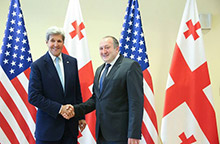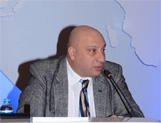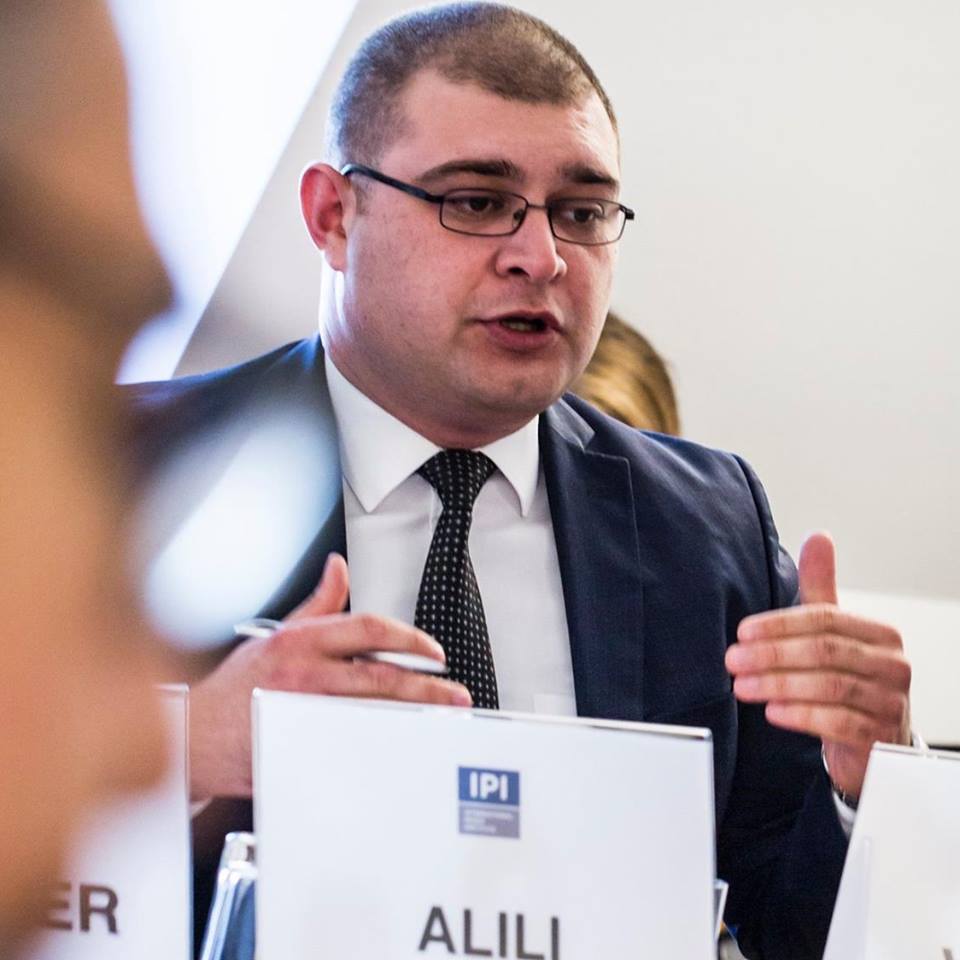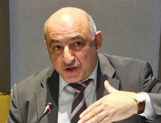In US–Iran Relations Compromise Is both Possible and Probable[Over]  By Benyamin Poghosyan, PhD, Chairman, Center for Political and Economic Strategic Studies By Benyamin Poghosyan, PhD, Chairman, Center for Political and Economic Strategic Studies
Iranian hardliners are mostly rational political actors who are not ready to sacrifice Iran's security, and their own power, for the sake of ideological animosity towards the US or Israel. Therefore, even if a hardliner won next June’s presidential election in Iran compromise with the US on the nuclear file would be not only possible, but probable. This would be in the interest of both the US and Iran, as well as the entire Middle East region.
Relations with Iran are among the top priorities for the Biden administration. Since President Trump withdrew the US from the Iran nuclear deal and imposed new sanctions in May 2018, Washington and Tehran have been on a collision course. Iran's decision to start to break some of the deal’s requirements in May 2019, and the assassination of General Qasem Soleimani in January 2020, added fuel to bilateral animosity. READ MORE
Is Armenia’s Democracy on Borrowed Time?[Over]  By Anna Ohanyan, PhD, non-resident senior scholar in the Russia and Eurasia Program of Carnegie By Anna Ohanyan, PhD, non-resident senior scholar in the Russia and Eurasia Program of Carnegie
Reeling from a military defeat in a war with Turkey-backed Azerbaijan, can Armenia’s hard-won democracy withstand domestic political turmoil?
The recent agreement to cease hostilities in Nagorno-Karabakh has created a new status quo in the South Caucasus. Azerbaijan has recovered territories it lost in the 1990s when the conflict over the enclave first erupted, in the shadow of the Soviet collapse. A new modus vivendi between Russia and Turkey is shaping regional geopolitics. Once shaky authoritarian rule in Azerbaijan is now more deeply entrenched. It can also count on the support of Turkey, another increasingly authoritarian player in the neighbourhood. This stronger and deeper authoritarian presence in the region will place significant stress on nascent democracies in Georgia and Armenia for years to come. READ MORE
What’s Next in Armenia – Russia Relations[Over]  By Benyamin Poghosyan, PhD, Chairman, Center for Political and Economic Strategic Studies By Benyamin Poghosyan, PhD, Chairman, Center for Political and Economic Strategic Studies
Relations with Russia were always a cornerstone for Armenian foreign policy. Since Armenia has regained its independence in 1991, Russia has been its essential political and military ally. Several reasons were behind such a choice – geopolitics, history, significant Armenian community in Russia. The Russian military base and border troops have been deployed in Armenia, and Yerevan joined Collective Security Treaty Organization and Eurasian Economic Union. Meanwhile, in the last 10-15 years, a discourse about Armenia’s dangerous overdependence on Russia was prevalent in Armenian and Western experts’ circles. Many perceived Armenia as a client state of Russia and called for changes. READ MORE
United States-Georgia Charter on Strategic Partnership: Defence and Security[Over]  By Eugene Kogan, Tbilisi-based defence and security expert By Eugene Kogan, Tbilisi-based defence and security expert
Established in 2009, the United States-Georgia Charter on Strategic Partnership is based on four core pillars: Defense and Security Cooperation; Economic, Trade and Energy Cooperation; Strengthening Democracy; and Increasing People-to-People and Cultural Exchanges. As part of these two countries’ defence and security cooperation, the US provides financial support to the Georgian military, support for Georgia’s territorial defence and sovereignty, and, ultimately, for Georgia’s procurement of US defensive weapons. READ MORE
Key Challenges for the Armenian Foreign Policy in 2021[Over]  By Benyamin Poghosyan, PhD, Chairman, Center for Political and Economic Strategic Studies By Benyamin Poghosyan, PhD, Chairman, Center for Political and Economic Strategic Studies
2020 was disastrous for Armenian foreign policy. The defeat in the 2020 Karabakh war which resulted in the November 10 capitulation has sent shock waves across Armenia and Diaspora. Within only 44 days Armenia lost what it gained during the 1992 – 1994 first Karabakh war. Significantly reduced Nagorno Karabakh was effectively turned into a Russian protectorate and its current status can be compared with Karabakh status in 1989 when the Soviet Union put Karabakh under the direct Kremlin control through the establishment of the Special Committee led by Mr. Arkadi Volski. Now approximately 3000 square kilometres of territory with some 100,000 Armenians there is again de facto governed by the Kremlin, while the head of the Russian peacekeeping mission LtG Muradov had assumed the role of Volski. READ MORE
Perspectives of the US-China relations: Implications for Armenia[Over]  By Benyamin Poghosyan, PhD, Chairman, Center for Political and Economic Strategic Studies By Benyamin Poghosyan, PhD, Chairman, Center for Political and Economic Strategic Studies
The four years of President Trump’s rule will most probably remain in the history of the United States as years of unprecedented turmoil. It started from Presidential executive orders to ban visas for several countries, continued with the tumultuous Russian investigation and impeachment process, almost permanent skirmishes with the key US allies, and ended up with an attack on the Capitol, suspension of the incumbent US President’s Twitter, Facebook and Instagram accounts, and the prospects of the second impeachment in the last days of the current administration. These extraordinary developments may force many to conclude that President Biden will make significant policy shifts in all major domestic and external issues. READ MORE
New Twists in Armenian-Russian Relations[Over]  By Benyamin Poghosyan, PhD, Chairman, Center for Political and Economic Strategic Studies By Benyamin Poghosyan, PhD, Chairman, Center for Political and Economic Strategic Studies
Armenia-Russia relations have been the cornerstone of Armenian foreign policy since Armenia’s independence in September 1991. Immediately after the collapse of the Soviet Union Armenia found itself in a multi-dimensional crisis – the war in Karabakh, a blockade imposed by Azerbaijan and Turkey, and steep economic decline. In those circumstances, Armenia had no alternative but to forge a strategic alliance with Russia. Thus, Yerevan signed the Collective Security Treaty in May 1992, Russian border troops were deployed along the Armenia–Turkey and Armenia–Iran borders, and in 1995 Russia took over the former Soviet military base in Gyumri. READ MORE
Political Crisis in Georgia after the Parliamentary Elections[Over]  By Nika Chitadze, PhD, Professor at the International University of the Black Sea, Tbilisi By Nika Chitadze, PhD, Professor at the International University of the Black Sea, Tbilisi
As it is well known from recent media reports, a new political crisis has emerged in Georgia after the October 31, 2020 parliamentary elections. The main reason for this crisis is the fact that the opposition parties have claimed that the Central Election Commission and the ruling party “Georgian Dream” have falsified the election results and have usurped the power. The National Democratic Institute and the American Republican Institute have expressed their critical views in this regard. A relatively soft position was stated by the OSCE Office for Democracy and Human Rights and the Council of Europe.
READ MORE
Why Armenians are Disappointed with NATO and the EU[Over]  By Benyamin Poghosyan, PhD, Chairman, Center for Political and Economic Strategic Studies By Benyamin Poghosyan, PhD, Chairman, Center for Political and Economic Strategic Studies
Despite being firmly anchored in the Russian sphere of influence, Armenia has been quite successful in developing partner relations with the EU and NATO. In the early 1990s, Armenia joined the NATO Partnership for Peace program, and since 2005 bilateral relations have been developing within Individual Partnership Actions Plans. NATO played a key role in developing Armenia's peacekeeping potential and supported defence reforms, including defence education. Armenian peacekeepers participated in NATO-led operations in Iraq, Kosovo, and Afghanistan; Armenian troops took part in several NATO-led drills; and each year a "NATO Week" was held in Yerevan. READ MORE
- December 16, 2020 06:00AM
Nagorno-Karabakh Becomes Russia's Latest Protectorate in the South Caucasus[Over]  By Benyamin Poghosyan, PhD, Chairman, Center for Political and Economic Strategic Studies By Benyamin Poghosyan, PhD, Chairman, Center for Political and Economic Strategic Studies
Azerbaijan, Turkey, and Russia all gained something as a result of the second Karabakh war, while Armenia and Nagorno-Karabakh lost almost everything.
The second Karabakh war ended with catastrophic results for Armenia and the Nagorno-Karabakh Republic. The trilateral statement signed by Russian, Armenian, and Azerbaijani leaders on November 10 was a clear capitulation of the Armenian sides. During the 26 long years of negotiations under the auspices of the OSCE Minsk Group, several settlement plans have been elaborated and offered to the conflict sides […]. However, none of them were as disastrous for Armenia and the Nagorno-Karabakh Republic as the trilateral statement of November 10, 2020. READ MORE
After the Elections, Georgia Needs to Walk Carefully on a Regional Tight Rope[Over]  By Benyamin Poghosyan, PhD, Chairman, Center for Political and Economic Strategic Studies By Benyamin Poghosyan, PhD, Chairman, Center for Political and Economic Strategic Studies
On October 31, 2020, Parliamentary elections took place in Georgia. Since 2012 Georgian politics is often perceived as a two-men show - billionaire Bidzina Ivanishvili and former President Mikhail Saakashvili. In 2012, Mr. Ivanishvili made a surprisingly successful bid to win Parliamentary elections and ousted President Saakashvili's United National Movement (UNM) party from power. Saakashvili left Georgia in 2013 after the end of his second Presidential term and entered Ukrainian politics becoming the governor of the Odesa region. […] Meanwhile, several criminal investigations were opened against him in Georgia, and a court sentenced him in absentia to several years of imprisonment. Mr. Ivanishvili left the Prime Minister's position in late 2013, but continued to de facto govern Georgia through the ruling Georgian Dream (GD) party. READ MORE
- November 26, 2020 08:43AM
US and Russian Involvement in Recent Domestic Upheavals in Georgia and Armenia[Over]  By Benyamin Poghosyan, PhD, Chairman, Center for Political and Economic Strategic Studies By Benyamin Poghosyan, PhD, Chairman, Center for Political and Economic Strategic Studies
After the collapse of the Soviet Union the newly independent successor states faced numerous challenges: economic collapse, ethnic conflicts, and a rapid introduction of market reforms which ushered in large scale poverty as well as a quick enrichment of very small portion of the population. At the same time, there was a constant flow of Western experts and consultants who were embedded in almost all state institutions. In the first decade of independence there was a vague but widespread perception that the ultimate destination of former Soviet republics would be membership of the Euro-Atlantic institutions - EU and NATO. READ MORE
What’s Next in Karabakh…[Over]  By Benyamin Poghosyan, PhD, Chairman, Center for Political and Economic Strategic Studies By Benyamin Poghosyan, PhD, Chairman, Center for Political and Economic Strategic Studies
The April 21, 2020 statements of Russian foreign Minister Lavrov brought back Nagorno Karabakh issue to the forefront of expert discussions. However, Russian foreign minister did not reveal something special or unexpected. He just reiterated what pundits following the conflict settlement process had already known. Since May 2018 negotiations have been based on a phased approach. It envisaged the return of some territories to Azerbaijan and indefinite postponement of the determination of the Nagorno Karabakh final status. READ MORE
Azerbaijan in 2020: Recent Developments and Future Foreign Policy Challenges[Over]  By Ahmad Alili, Head of Research, Caucasus Policy Analysis Center, Baku
By Ahmad Alili, Head of Research, Caucasus Policy Analysis Center, Baku
At the dawn of the unipolar international system – following the collapse of the Communist system in Eastern Europe and the South Caucasus – “the end of history” was announced. It was expected that the benevolent hegemony of the United States would last for many decades to come – liberal values and democracy would be spread to each corner of the world. The events of recent years and the chaos in the international order shows that the world is transforming from a unipolar world into a multipolar one. This transformation process has its reverberations in regions such as the South Caucasus. READ MORE
Special but Not Quite Strategic[Over]  By Benyamin Poghosyan, PhD, Chairman, Center for Political and Economic Strategic Studies By Benyamin Poghosyan, PhD, Chairman, Center for Political and Economic Strategic Studies
Two key topics concerning Georgia dominated the attention of the international media and expert community interested in the South Caucasus in past week. One was the outbreak of the novel Coronavirus and the growing number of cases identified in Georgia; the second issue was connected with domestic politics.[…] However, from regional perspective the key event of the past week was the official visit of Armenian Prime Minister Nikol Pashinyan to Georgia on March 3 - 4. READ MORE
Precarious Situation in Iran Doesn’t Mean State-collapse Soon[Over]  By Benyamin Poghosyan, PhD, Chairman, Center for Political and Economic Strategic Studies By Benyamin Poghosyan, PhD, Chairman, Center for Political and Economic Strategic Studies
On February 21, 2020 Iranians went to polling stations to elect their new parliament. Despite all the statements of Iran's leadership, including of the Supreme Leader Khamenei, of the importance of a high turnout, only 42 percent of registered voters casted their ballots, the lowest figure since the 1979 Islamic Revolution. Many inside and outside Iran saw this low turnout as a tacit protest of a large part of the electorate against the Guardian Council's decision to cancel the registration of many moderate and reformist candidates. Supreme Leader blamed the low turnout on the "negative propaganda" about the new coronavirus by Iran's enemies. READ MORE
Rivals in the Midst of Domestic Transformations[Over]  By Benyamin Poghosyan, PhD, Chairman, Center for Political and Economic Strategic Studies By Benyamin Poghosyan, PhD, Chairman, Center for Political and Economic Strategic Studies
On February 9, 2020 early parliamentary elections were held in Azerbaijan. According to preliminary results the ruling "New Azerbaijan" party has won a clear majority, while, some representatives of opposition, such as Erkin Gadirli from REAL, have entered the Parliament. However, the main speculation around the elections was not the name of the winner; few if any had expectations that ruling party may lose the elections, or that the process will be in full compliance with liberal democracy requirements. The key question is on the implications of these elections for the domestic balance of power in Azerbaijan, and the future development of the country. READ MORE
- February 25, 2020 21:11PM
Rivals in the Midst of Domestic Transformations[Over]  By Benyamin Poghosyan, PhD, Chairman, Center for Political and Economic Strategic Studies By Benyamin Poghosyan, PhD, Chairman, Center for Political and Economic Strategic Studies
On February 9, 2020 early parliamentary elections were held in Azerbaijan. According to preliminary results the ruling "New Azerbaijan" party has won a clear majority, while, some representatives of opposition, such as Erkin Gadirli from REAL, have entered the Parliament. However, the main speculation around the elections was not the name of the winner; few if any had expectations that ruling party may lose the elections, or that the process will be in full compliance with liberal democracy requirements. The key question is on the implications of these elections for the domestic balance of power in Azerbaijan, and the future development of the country. READ MORE
- February 17, 2020 23:16PM
The Perspectives of Russia–Iran Relations in the Context of the Recent US–Iran Escalation[Over]  By Benyamin Poghosyan, PhD, Chairman, Center for Political and Economic Strategic Studies By Benyamin Poghosyan, PhD, Chairman, Center for Political and Economic Strategic Studies
The recent US – Iran escalation is the hot topic for the Middle East pundits. Many policy briefs have already been published discussing the motives behind the US and Iran actions, the implications of these developments on the US Presidential campaign and Iranian Parliamentary elections. Many experts are seeking to assess the future of the US – Iran relations and the Iran’s influence in the region. Meanwhile, US – Iran tensions which fell short of a full blown war will have an impact also on Russia – Iran relations and in particular on their uneasy partnership in Syria. READ MORE
The Uncertain Future of EU Enlargement: Implications for the South Caucasus[Over]  By Benyamin Poghosyan, PhD, Executive Director, Political Science Association of Armenia By Benyamin Poghosyan, PhD, Executive Director, Political Science Association of Armenia
In 2019, the EU and six Partner states are celebrating the 10th anniversary of the Eastern Partnership (EaP) program. Many conferences, expert workshops and other events were organized to assess the success and failures of the EaP. Meanwhile, alongside assessments of the past, the future of the program is also being actively discussed. EU even launched the ‘Structured Consultation” on the future strategic direction of the EaP and tasked the European Commission and the European External Action Service to present proposals. Member States and Eastern Partners, as well as other actors, including civil society, academia and think-tanks were invited to share their views on a new post-2020 policy framework, and the perspectives of EU enlargement. READ MORE
- December 24, 2019 21:46PM
Russia, China and the West. And Armenia in the Middle[Over]  By Benyamin Poghosyan, PhD, Executive Director, Political Science Association of Armenia By Benyamin Poghosyan, PhD, Executive Director, Political Science Association of Armenia
Prospects of Russia - China relations are currently hotly debated by international security pundits. The West in general, and the US in particular, see these two states as key adversaries seeking to undermine the international world order. Simultaneously, the prevailing mood among Western expert and academic circles is confident that, at the end of the day, China is a more significant challenge to Russia than it is to the West, given the vast and scarcely populated areas of Siberia and the Russian Far East bordering China. READ MORE
- November 20, 2019 06:50AM
Armenia-Azerbaijan: Searching for New Models of Dialogue[Over]  Joint Study with “Yeni nesil”, coordinated by Boris Navasardian, President, Yerevan Press Club Joint Study with “Yeni nesil”, coordinated by Boris Navasardian, President, Yerevan Press Club
The main purpose of this study was to consider the feasibility and prospects of revival of the Track-2 diplomacy and the development of appropriate recommendations. Although it was conceived and supported by the US government even before the political changes in Armenia, its relevance was confirmed by the intensification of the dialogue at the official level between Yerevan and Baku in the summer of 2018. Certain characteristics of the renewed interest in the informal communication were revealed during the visit to Yerevan of the Azerbaijani journalist Shahin Hajiyev, in February 2019, and by the interest of Armenian journalists to visit the neighboring country. READ MORE
Perspectives of EAEU – EU Relations [Over]  By Benyamin Poghosyan, PhD, Executive Director, Political Science Association of Armenia By Benyamin Poghosyan, PhD, Executive Director, Political Science Association of Armenia
The relations (or the lack thereof) between the Eurasian Economic Union (EAEU) and European Union (EU) are one of the key topics of debate between international relations pundits. There are different assessments regarding the current situation and the way forward. However, almost all experts agree that the key issue here resides in the relationship between Russia and the West (US/EU/NATO). As long as this relationship is at its lowest point since the end of the Cold War, there is almost no chance of any substantial cooperation between these two organizations. READ MORE
US Strategic Goals in the South Caucasus Do Not Coincide with Armenian National Interests[Over]  By Benyamin Poghosyan, PhD, Executive Director, Political Science Association of Armenia By Benyamin Poghosyan, PhD, Executive Director, Political Science Association of Armenia
Relations with the United States are of significant importance for Armenia. Despite the relative decline in the US position as the only world super power, Washington still remains the number one global power in the world. The US is a Minsk Group Co-chair country, actively involved in the Karabakh conflict settlement process, and it exerts great influence in the neighborhood of Armenia. America is also home for the most influential part of Armenian Diaspora, which may play a key role in bringing desperately needed investments into the Armenian economy. READ MORE
- September 3, 2019 21:26PM
The Number of People in Extreme Poverty Reaches Historical Minimum [Over]  By Nika Chitadze, PhD, Director, Center for International Studies, International Black Sea University, Tbilisi By Nika Chitadze, PhD, Director, Center for International Studies, International Black Sea University, Tbilisi
As good news is less scandalous, it is rarely spread. However, it is necessary to point out that the percentage of people, who live in poverty, reached a historic minimum in 2018. Unfortunately, there was no appropriate reaction of the international community regarding this development.
Over the last 30 years, the number of people who live in poverty has decreased by 1 billion.
READ MORE
|
|